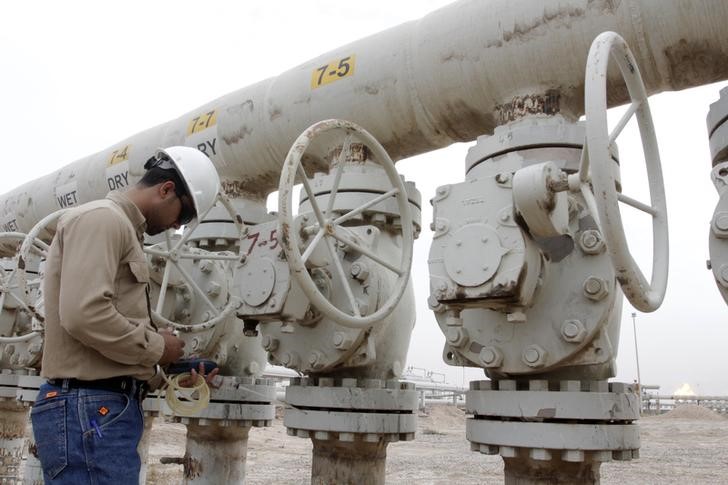* Trump, Putin agree to talks on energy market stabilisation
* Texas regulatory official seeks oil output cuts
* Saudi plans to lift exports to 10.6 mln barrels from May
(New throughout, updates prices, market activity and comments)
By Devika Krishna Kumar
NEW YORK, March 31 (Reuters) - Oil prices steadied on
Tuesday, with the U.S. crude benchmark climbing off 18-year lows
after U.S. President Donald Trump and Russian counterpart
Vladimir Putin agreed to talks on stabilising energy markets.
Gains were limited as global demand was still being slammed
by travel restrictions due to the coronavirus pandemic.
May Brent crude futures LCOc1 was 2 cents lower at $22.74
a barrel by 12:48 p.m. ET (1648 GMT) ahead of expiration after
closing on Monday at $22.76, its lowest finish since November
2002. It hit a session high of $23.87. The more-active June
contract LCOM0 traded 9 cents lower at $26.33 a barrel.
U.S. crude Clc1 was up 23 cents at $20.32 after settling
in the previous session at $20.09, its lowest since February
2002. It traded as high as $21.89 a barrel during the session.
Oil markets have faced a double whammy from the coronavirus
outbreak and a race to win market share between Saudi Arabia and
Russia after OPEC and other producers failed to agree on deeper
supply cuts.
Trump and Putin agreed in a phone call to have energy
officials discuss stabilizing oil markets, the Kremlin said on
Monday.
Despite a recovery in the futures market, physical cargoes
are selling in some regions at single digits, reflecting hefty
discounts.
With oil prices down about 60% this year, a commissioner
with the Texas state energy regulator renewed a call for
restrictions on crude production.
In a further sign of how well the market is supplied, the
front-month Brent futures contract for May is trading at a
discount of $13.95 a barrel to the November contract
LCOc1-LCOc7 , the widest six-month contango spread ever seen.
U.S. crude producers probably face cuts in April anyway as
there are no buyers in physical markets for crude in the
Permian, the biggest shale basin the country, or the U.S. Gulf
Coast, said Scott Shelton, energy specialist at United ICAP.
"It's just a matter of time before we see the producers be
forced by the crude gatherers to cut as one cannot 'gather'
crude when there are no buyers or tanks to store it in," he
said.
U.S. crude output fell to 12.7 million barrels per day (bpd)
in January from 12.8 million bpd in December, the U.S. Energy
Information Administration (EIA) said in a monthly report on
Tuesday. That was the first time since July 2019 that U.S. crude
output has declined two months in a row. A contango market implies traders expect higher oil prices
in the future, encouraging them to store oil now to sell later.
Saudi Arabia, de facto leader of the Organization of the
Petroleum Exporting Countries (OPEC), plans to boost its oil
exports to 10.6 million barrels per day (bpd) from May on lower
domestic consumption, a Saudi Energy Ministry official said.
Global oil refiners, meanwhile, have cut throughput because
demand has slumped for transportation fuel, with European
refineries reducing output by at least 1.3 million bpd, sources
told Reuters. Exxon Mobil Corp XOM.N closed a small crude distillation
unit at its 502,500 bpd Baton Rouge refinery in Louisiana
because of low demand, sources said. The chief economist for global commodities trader Trafigura
said that oil demand could fall in the coming weeks by as much
as 30% from consumption at the end of last year. A Reuters survey of 40 analysts forecast Brent crude prices
LCOc1 would average $38.76 a barrel in 2020, 36% lower than
the $60.63 forecast in a February survey.
